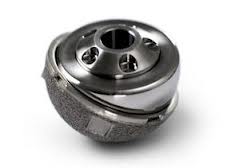 Hip implant payout tops $50 million (Journal Gazette)
Hip implant payout tops $50 million (Journal Gazette)
800 part of Biomet settlement
Biomet Inc. has agreed to pay a base rate of $200,000 each to patients who received a specific hip model and had to have it replaced, according to court documents.
Company officials estimated in a Securities and Exchange Commission document that the total payout could exceed $50 million.
The settlement was reached 16 months after about 1,000 lawsuits were combined in multidistrict litigation against the Warsaw-based orthopedic device-maker.
It was not a class-action suit because class actions are used only when every plaintiff is seeking the same amount in damages, attorney Tom Anapol said.
In this case, the $200,000 base settlement can be increased or decreased on a case-by-case basis, depending on circumstances.
Biomet’s M2A Magnum hip implant was one of several metal-on-metal models that were once heralded as the latest advancements in joint replacements. Competing manufacturers, including DePuy Orthopaedics Inc. and Zimmer Inc., also sold them. Artificial hip joints can also be made of plastic or ceramic.
Because metal parts rub against each other during normal wear, some patients have experienced pain, swelling, reduced movement or muscle damage related to metal shavings released into the body. Dangerous levels of metal were found in some patients’ bloodstreams.
The parties in this week’s settlement stressed that the Biomet hip was never recalled and continues to maintain the lowest failure rate in the industry.
Even so, about 800 patients who received the hip had problems that prompted them to have the hip surgically removed and replaced, Anapol said Thursday during a phone interview. He was co-lead counsel for the plaintiffs, a nationwide group.
The 235 people who filed lawsuits but haven’t had the metal-on-metal hip replaced aren’t eligible to participate in the settlement. If they require replacement – also called revision – surgery later, they can file new lawsuits.
Warsaw-based DePuy, a unit of Johnson & Johnson, in 2010 recalled a metal hip implant after it was linked to high failure rates.
In November, the parent company agreed to pay more than $4 billion to plaintiffs who received the DePuy-made ASR hip implants. The settlement allocates money to patients based on several factors, including age, extent of injuries and whether they had to replace the defective implant. That agreement set the base rate at $250,000 per patient, Anapol said.
The attorney is satisfied that his clients received a fair settlement with Biomet – even though it is a lower amount – because of the relatively low failure rate for the M2A Magnum hip.
Plaintiffs were represented by Anapol, of Anapol Schwartz in Philadelphia, and Mark Lanier, of The Lanier Law Firm in Houston, Los Angeles and New York. Both firms specialize in product liability cases.
Biomet released a statement on Monday. It said, in part: “Biomet is pleased to have reached this settlement and have the (multi-district litigation) resolved.”
The same day, the company filed an SEC document that estimated payment could exceed the $50 million fund Biomet has established to pay claims related to the metal-on-metal hip product.
If and when that reserve is exhausted, the manufacturer will file insurance claims. Biomet maintains an additional $100 million in outside insurance coverage, according to the filing.
Although some of the insurance carriers have warned they might deny coverage, Biomet officials are confident that any claims would fall within coverage terms of the policies.
Anapol declined to make any of his clients available to share personal stories Thursday. Although a settlement has been reached, Biomet has reserved the right to opt out of the agreement if less than 90 percent of the plaintiffs choose to participate in the deal.
The attorney doesn’t want to do anything that would jeopardize future settlement talks – if they become necessary.
Biomet hip device recipients have, in some cases, been required to make co-payments for a second surgery to remove and replace the implant. But Anapol considers that potential expense minor compared to what the federal government and private health insurers would have paid for those surgeries and hospital stays.
If the government and insurance companies want to seek payment from Biomet related to the M2A Magnum hip, they’ll have to make separate arrangements with the company, Anapol said. This week’s agreement doesn’t address those costs.
Anapol described the settlement payouts as mostly addressing patients’ pain and suffering.
